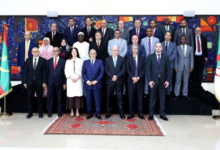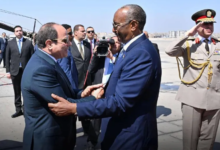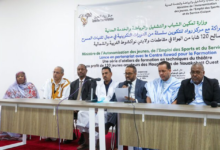A Radical Transformation in the National Education System during His Excellency President Mohamed Ould Sheikh Ghazouani’s Term: Comprehensive Reform and Enhancement of Education Quality in Mauritania

During the first term of His Excellency the President of the Republic, and continuing into the beginning of his second term, the education sector and the reform of the educational system witnessed a qualitative and fundamental transformation encompassing all its aspects, which significantly reflected on the quality of educational outcomes nationwide.
One of the most prominent features of this transformation was the adoption of the “Republican School,” a practical embodiment of a vision that places education at the forefront of national priorities. Since the start of his first term in 2019, His Excellency President Mohamed Ould Sheikh Ghazouani has devoted great attention to education, considering it a cornerstone for the present and a guarantee for the future, as well as a main pillar to address current challenges and future ambitions. Achieving this is only possible through comprehensive educational reform that ensures a safe and sustainable transition toward improvement.
In an interview with the Mauritanian News Agency, the Director General of Human Resources at the Ministry of Education and Educational System Reform, Mr. Salek Ould Jeddo, confirmed that the reforms implemented have greatly contributed to enhancing, developing, and reforming the educational system’s performance.
He pointed out that the focus on education as a fundamental element and key component of development has always been a priority for His Excellency the President and is not a recent development. The “My Commitments” program included clear pledges in the field of education, which is considered a cornerstone of national development. Among the main pillars of reform was a broad consultation process involving all segments of Mauritanian society, resulting in recommendations that reflect the country’s specificity and align with the diversity and cultural identity of Mauritania.
He added that a key feature of the current educational reform is the empowerment of governance within the framework of the National Education System, which materialized through the rewriting of the legal texts governing the sector, known as the “Guiding Law,” alongside activating the role of supervisory bodies represented by regional administrations and local elected officials who oversee education to ensure the process runs in an organized and effective manner.
He highlighted a qualitative leap in infrastructure and human resources, noting an increase of 4,200 classrooms, with ongoing work under the “Urgent Program for Expanding Access to Basic Services for Local Development” to add more than 6,114 additional classrooms. Furthermore, 128,500 desks have been distributed, and 18,500 educational units have undergone maintenance.
Regarding human resources, he explained that 11,093 teachers have been recruited in recent years, and approximately 1,000 student-teachers are currently receiving training in teacher training schools whose curricula have been reformed, exams standardized, and training staff increased by 100 instructors.
In the context of digital transformation and modernization, Salek Ould Jeddo confirmed the equipping of 13 multimedia classrooms for distance learning in regional capitals, in addition to 47 computer rooms connected to the internet, furnished with 770 laptops and 3,400 tablets.
He also emphasized the historic introduction of teaching national languages, aiming to strengthen social cohesion and foster mutual understanding among community members.
This structural update coincided with the preparation of curriculum frameworks for the first time in the country’s history, which were approved and used as the basis for new programs, alongside lesson preparation for all educational levels.
Concerning training, the Director General stated that 27,500 teachers across various stages and specializations have been trained, with special support provided to science teachers to develop their skills and keep pace with continuous advances in scientific fields. He noted Mauritania’s achievement of 40 medals since 2020 in international competitions, mostly in scientific subjects, as well as 7 certificates of excellence awarded through student participation.
He added that scientific convoys have been sent to schools in remote areas, equipped with portable laboratory tools, teacher training, and issuance of educational guides to enhance the quality of science instruction.
As part of measures to motivate teachers and supervisors, he pointed out a 150% increase in the distance allowance, raising the chalk allowance to 45,000 old ouguiyas and extending it to cover all months of the year, benefiting supervisory staff as well. Additionally, general salary increases were granted, including a 20,000 ouguiya raise (January 2023), a 60,000 ouguiya allowance (April 2025) for contract teachers, and 20,000 ouguiyas for sixth-grade primary teachers.
The textbooks have also witnessed notable qualitative and quantitative progress, with the number of kiosks doubling to 178 this year compared to 53 in 2019. More than 5.8 million books have been distributed up to the end of the 2024-2025 academic year, accompanied by a new production and distribution policy to ensure quality and transparency.
Regarding school sponsorships, the number of beneficiary schools increased to 1,711, representing 45% of educational institutions, serving 242,000 students in the most vulnerable groups.
To improve administrative and educational management quality, Salek Ould Jeddo confirmed the creation of the “Siraj” system, which accurately organizes student registries, monitors their academic progress, facilitates communication among various educational stakeholders, and provides a precise centralized database to support decision-making regarding promotions and transfers according to the ministry’s approved regulations.
He added that this comprehensive information system enabled monitoring teacher deployment nationwide and facilitated managing teacher data. Furthermore, the national examination system was modernized by securing certificates and launching an online portal for candidate registration








